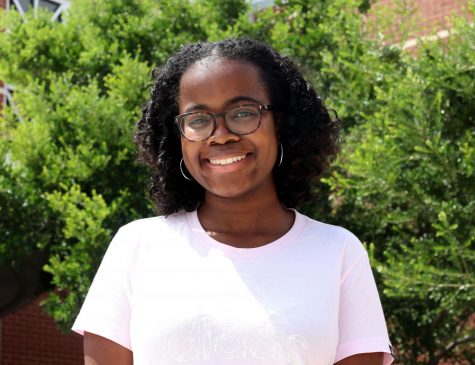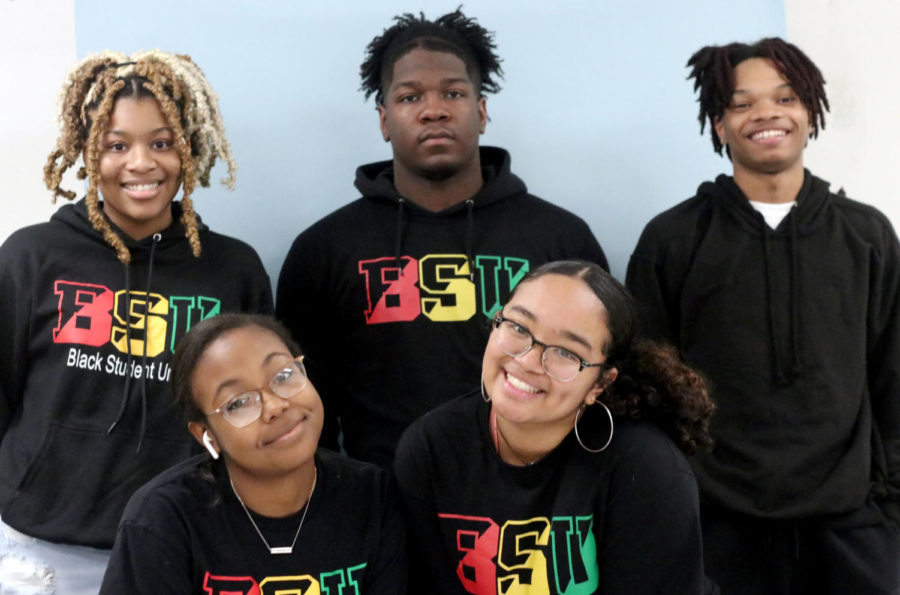Q&A: BSU members reflect on culture, identity
The month of February is nationally recognized as Black History Month. Originating as Negro History Week, Black History Month was recognized on many college campuses by the late 1960s and was first recognized by president Gerald Ford in 1976. A few Black Student Union (BSU) members shared about what their race and embracing their identity means to them.
Q: Who in your life inspires you to embrace your culture?
Sophomore Alona Craddock: “Definitely my mom. She’s a pharmacist, and I’ve seen her have to adapt to different places — she never got to wear her hair the way she really wanted to. That inspired me to wear mine the way I want. My hair is a big part of my life, so that definitely inspires me. [My mom] does my hair sometimes.”
Junior Dayln White: “Probably my parents. Especially my dad. He taught me to embrace who I am, who my culture is. It taught me to learn about what actually happened to us back in the day and not accept lies.”
Senior Javon Holloway: “Probably either my grandmother or sister; I’m [closest to them] in my family. [They are] always keeping me going, keeping my confidence up, making sure I’m doing well in school and [are] always there for me.”
Sophomore Kionna Johnson: “I had people who told me that I shouldn’t. They told me that I couldn’t stand up for the Black side — especially last year, [with the] Black Lives Matter movement, because I was only half black. I shifted toward my Black culture because all my life I’ve known my Asian culture. It wasn’t really who inspired me, it was who made me snap. I took [that journey] by myself.”
Sophomore Reagan Mitchell: “Honestly, I feel like everybody incorporated in BSU [has] really made a statement [of] ‘this is Black, this is us.’ There’s not a single person I can pin down [who has] made my whole thought process change. Everybody included [in BSU] has just made me accept it more and been proud of it here. Especially at school.”
Q: Who is a Black public figure past or present who inspired you?
Craddock: “I know this is cliche, but Zendaya. I really love how she, being a light-skinned actress, recognizes her privilege. Even though she is a Black woman, I like how she steps down and gives other Black women, darker-skinned women, roles when most of Hollywood would rather give it to Zendaya or some other light-skinned actress.”
White: “I started reading about Malcolm X in elementary school. I think [he’s] probably the first person. I saw him before I saw MLK.”
Holloway: “Since I’ve already played sports, probably LeBron. He’s probably been the biggest person. I’ve always followed him through my life.”
Johnson: “We all know about MLK and Rosa Parks, but who inspired me was the 15-year-old pregnant woman before Rosa who did the same thing. They don’t educate us because they don’t think that we know. She inspired me the most when I found out in fourth grade.”
Mitchell: “Viola Davis inspires me because she’s doing it. You don’t see dark-skinned Black girls on TV a lot. It’s [usually] like the lighter, mixed kids. But Viola Davis, [as] a dark-skinned woman in America, is [one of] the top paid [actresses]. That’s amazing that she could accomplish that even though the world may not see her as much. Her being her is so inspirational for me because if she can do it, I can do it. I love Viola.”
Q: What makes you proud of your culture?
Craddock: “100% the music. I love R&B and rap is a huge part of today, and I feel like a lot of Black people are a part of the rap industry.”
White: “Probably my hair. Knowing certain people have this type of hair and not many people can do what we can do with it [makes me] take pride in my hair.”
Holloway: “Just who we are. We’re our own people, [and] we’re different from everybody else. We just lead; I feel like every black person in this world is a leader in some type of way.”
Johnson: “I love the color of my skin, and I’ve grown to love that. It just makes me so proud. I love the way we hold ourselves as confident even though I know we’re all going through something. And that’s not just with one race, that’s everybody together. It’s just amazing how we put it up front together, but we all struggle with something by ourselves.”
Mitchell: “Something that makes me proud is how we’re unapologetically us. I know that sounds cliche — I did get that off of Instagram, but that doesn’t matter. Our whole race as a unit has [kind of] been silenced in a way. So I feel like us being loud and open about what we want [and] who we are is different.”
Q: What would you say to your younger self about race or your racial identity?
Craddock: “Mostly just embrace it. I’ve developed a love for my hair. I used to have my hair straightened a lot, and I’ve never really branched out with my styles, and now I’m doing so. I’d tell my younger self to have self-love. Growing up, watching a bunch of white girls on Disney channel could be really deprecating. So now I’d say to embrace who you are.”
White: “I’d probably say be careful what they teach you in history in elementary school. One time after elementary, I went to my dad and he got mad at my teacher for kind of telling us lies about slavery and what actually happened. Be careful what they tell you back then and later on.”
Holloway: “The biggest thing I would tell myself [is] be you.”
Johnson: “There’s so much I want to say to my younger self. I would tell her to embrace who she is. I was figuring out how to do what I had to do with my hair and I’d kind of put in a braid, put it in a bun, didn’t brush it out. I wish she learned how to take care of her hair better and just simple things like that. The simple things we aren’t taught because with different curl patterns, you have to take care of it differently.”
Mitchell: “I grew up [around] a lot of white people, [and] I could count on my hands [the number of] Black people at my elementary school. I felt like an outsider or I wanted to be something I could never be. So I’m finally like, ‘Reagan, you’re Black. Black is beautiful.’ But no one could tell me that in kindergarten. I was like, ‘No, it’s not. Stop lying to me.’ If I could tell my younger self, I’d [say,] ‘Just wait. You’re going to be happy about how you look, what you do, the foods you eat [and] the way you celebrate things that are different.’ When I was younger I was kind of ashamed, and that’s embarrassing to say because, you’re ashamed to be Black? But lowkey, I was. I’m proud of it now. [I’m] like, wow, Black is beautiful. Black is community. Black is proud. Black is awesome.”

Senior Katherine Parker is the managing editor and this is her second year on staff. She loves journaling and spending time outdoors. In her free time,...



